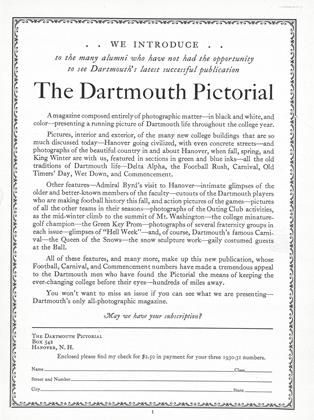The state Izaak Walton League during the summer in the ever discouraging pursuit of funds for conservation purposes hit on the scheme of inviting Rear-Admiral Byrd to speak in the stadium at Hanover on October 13, Columbus Day. The plan went through and the Commander was given a reception such as he has undoubtedly never before received. At Bellows Falls he was taken from the train and escorted to the outskirts of Hanover where he changed to a student car. At the end of Main Street there awaited him a colorful parade composed of the Dartmouth Band, Palaeopitus, Green Key, Cabin and Trail, and the Newport American Legion drum corps. The entire student body, released early from classes at noon, lined Main Street together with several thousand visitors. Proceeding to the middle of the campus Byrd there said a few words of welcome to the spectators and then continued to the Outing Club House. Here the Outing Club, which took care of the student end of the program, was host to the speaker and the official party at a luncheon. A number of distinguished visitors were present, including Governor Tobey of New Hampshire, Senator Moses of New Hampshire, Governor Weeks of Vermont, Colonel Lincoln, the commander of the Eastern army air forces, President Hopkins, Dean Laycock, R. L. Morgan, president of the Izaak Walton League, Fred Harris, founder of the Outing Club, representatives from several New England governors, a number of aviators, and the reception committee of the Izaak Walton League. The student atmosphere was maintained through the presence of the D. O. C. Council, the chairman of which welcomed the guests to Dartmouth, in behalf of the College, student body and the Outing Club.
Following the dinner Commander Byrd addressed a gathering of eight thousand at the stadium through the medium of a huge amplifier. Senator Moses, as the chairman of the meeting, introduced each of the state representatives and finally the famous explorer himself. Byrd, falling often into his southern accent, first praised the Outing Club for its work, stating that if he ever ran another expedition he would come to Dartmouth for his skiers; and then described a number of interesting features of his trips to the two poles. Byrd left a favorable impression with the student body because of his modesty and lack of affectation.
 View Full Issue
View Full Issue
More From This Issue
-
 Article
ArticleThe Class of 1934
November 1930 By Charles R. Lingley -
 Class Notes
Class NotesCLASS OF 1930
November 1930 By Albert I. Dickerson -
 Lettter from the Editor
Lettter from the EditorEditorial Comment
November 1930 -
 Class Notes
Class NotesCLASS OF 1913
November 1930 By Warde Wilkins -
 Class Notes
Class NotesCLASS OF 1920
November 1930 By Allan M. Cate -
 Article
ArticleA Course in the Department of Biography
November 1930 By Harold E. B. Speight








